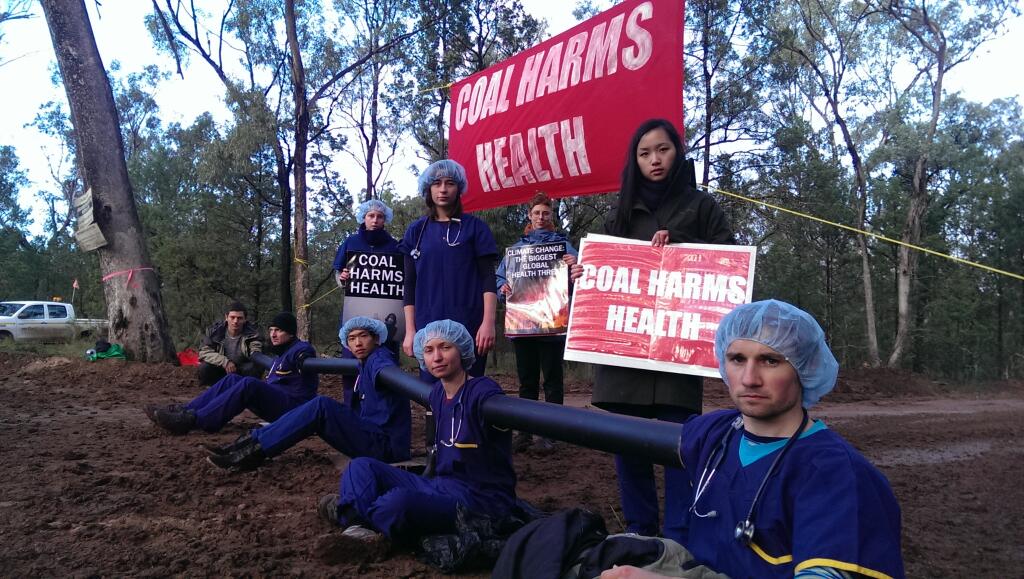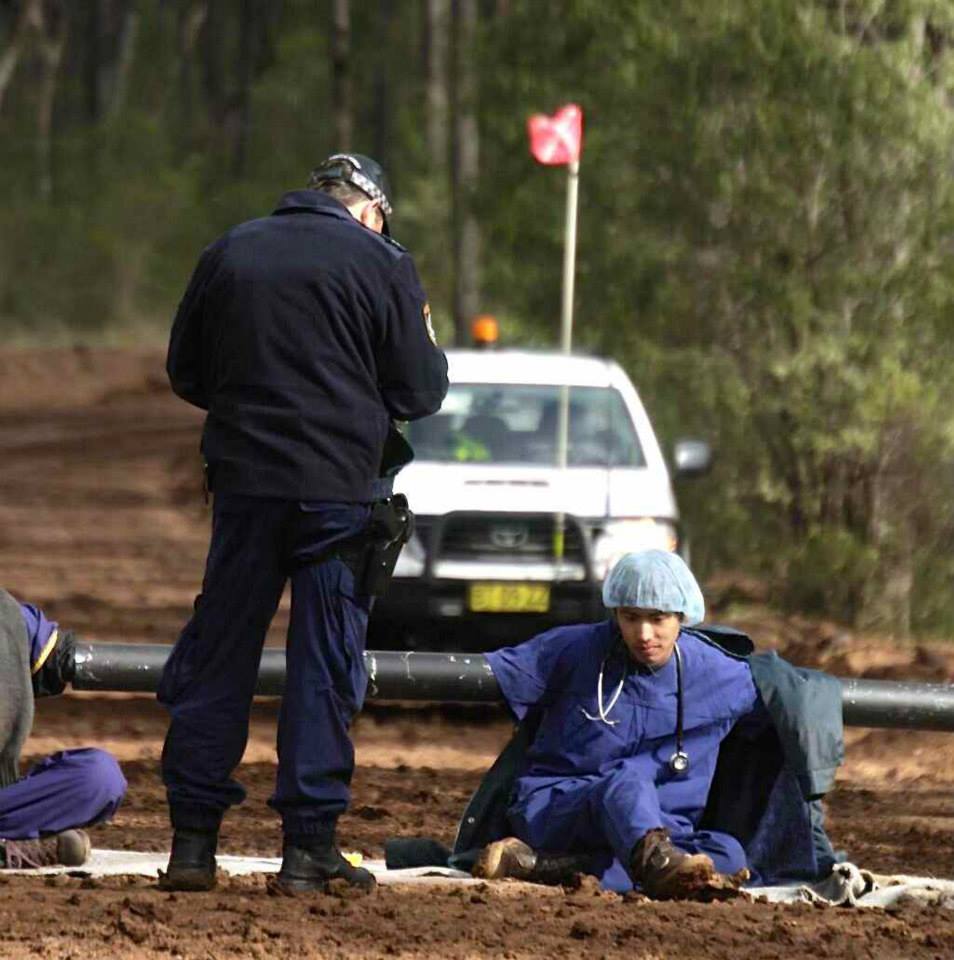On Saturday May 3rd, a group of medical doctors and medical students calling themselves “Medics Against Coal” blocked the main entrance to Whitehaven Coal’s Maules Creek Project in northeastern New South Wales, Australia. It was a powerful demonstration against the clearing of half of Leard State Forest to make way for what would be one of the largest coal mines in Australia.
The proposed mine is expected to produce 13 million tonnes of coal every year which, when burnt, poses serious health threats to both local and global communities. In this blog, one of the doctors, Dr Harry Jennens (MBBS Hons, BMedSc) explains why he was driven to take direct action, as a doctor, to stop a coal mine.
Applying the Golden Rule
Primum non nocere: “First do no harm”
The first tenet of the Hippocratic Oath nudges medical professionals toward conservatism. We often harbour concerns about societal structures that impinge on health, and may share them with our peers. In most cases, we leave addressing them to others, and focus on our work at hand.
Yet there are times when an activity is so damaging, so heinous, that to not speak out against it is an abrogation of our responsibilities to public health. There are times when others need reminding of our first golden rule.

Dr Harry Jennens (in the foreground), with the “Medics Against Coal” taking direct action to stop the Maules Creek coal mine in Australia.
On the morning of May 3rd, 2014, I stood at the main entrance of the Maules Creek Coal Mine Project, a new development by Whitehaven Coal in the Leard State Forest in northern NSW. I was fourth in a line of doctors and medical students: to my right were medical resident Dr Sujata Allan (MBBS), medical student Lin Wang (BBmed), and anaesthetist Dr Ingo Weber (MBBS, FRACGP, GDRGP, FANZCA). Uniformed in medical scrubs and stethoscopes, and bound arm to arm by cables and plastic piping, we formed a human blockade barring the workers and their vehicles from accessing the mine site.
The health hazards of coal mining and combustion are well documented. Air pollution from coal dust causes heart attacks, lung disease, cancers and strokes1. In addition, coal combustion fuels climate change, which already kills over 140,000 people worldwide annually2, threatens to kill many times more, and which has been identified as the greatest global health threat of the 21st century3. Medical organisations such as the Lancet, the British Medical Journal, and the Australian Medical Association have all called for urgent reductions in greenhouse gas emissions as a health imperative3, 4, 5.
In this context, and with the current proliferation of available renewable energy technologies6, further expansion of Australia’s coal industry would seem not just ill-informed, but dangerously irresponsible. And this is exactly what Whitehaven’s Maules Creek Project is – a project bent on ravaging the Leard State Forest to unearth 13 million tonnes of coal per year. If burned, this coal would emit as much carbon dioxide as the entire energy sector of New Zealand7. The health ramifications for both local and global communities make this scheme medically, and hence morally, indefensible.
 Standing on the road outside the mine before friends, miners and police, I reflected on the risks and benefits of my decision. (I subsequently found the personal consequences of civil disobedience, for someone in my position, to be quite minor). And I remembered who I was standing there for.
Standing on the road outside the mine before friends, miners and police, I reflected on the risks and benefits of my decision. (I subsequently found the personal consequences of civil disobedience, for someone in my position, to be quite minor). And I remembered who I was standing there for.
I remembered the 980 Australians who perished during the heatwaves of January 2009 – 374 more than the expected average for that time of year8.
I remembered my friend Pathak Lal Golder, who led a climate campaign among Bangladeshi peasants in 2011, and who had related to me the stories of his people struggling with cyclones, floods, and the prospect of total inundation9.
I remembered the millions of children in South Asia and Africa who are projected, by 2050, to be malnourished as a result of climate change and crop failures10. How many might starve outright, victim to our negligence, our timorousness? What would we say to these children if they stood before us now?
I was reminded of the words of the acclaimed American environmentalist and author Bill McKibben: “Getting arrested is not the end of the world. The end of the world is the end of the world.”
And I smiled knowing that, as a doctor in Australia and as a citizen of the world, my best course of action was clear.
—-
Dr Harry Jennens (MBBS Hons, BMedSc) is a Melbourne-based medical intern and co-founder of the newly formed Medics Against Coal, a group of doctors, students and friends keen to generate action on climate change on health grounds. He’s happy to be contacted at [email protected]
—-
References:
1. The Climate and Health Alliance, 2013. Submission to Senate Standing Committees: Community Affairs – Inquiry into the impacts on health of air quality in Australia. Available at: https://caha.org.au/wp-
2. World Health Organization. Fact Sheet #266: Climate change and health. (updated Nov 2013). Available at: https://www.who.int/
3. Lancet and University College London Institute for Global Health Commission, 2009. Managing the health effects of climate change. Available at: https://www.ucl.ac.uk/
4. McCoy, D, Montgomery, H, Arulkumaran, S & Godlee, F. Climate change and human survival. BMJ 2014; 348: g2351
5. The Australian Medical Association, 2014. IPCC report signals need to plan for health effects of climate change. Available at: https://ama.com.au/media/
6. Beyond Zero Emissions, 2010. The Zero Carbon Australia Stationary Energy Plan. Available at: https://bze.org.au/zero-carbon-australia/stationary-energy-plan
7. 350 Australia (webpage): https://350.org.au/
8. The Climate Commission (2011). The critical decade: climate change and health. Available at: https://climatecommission.
9. The Bangladesh Krishok Federation (webpage): https://www.krishok.
10. Lloyd, S.J., R. Sari Kovats, and Z. Chalabi, 2011: Climate change, crop yields, and undernutrition: Development of a model to quantify the impact of climate scenarios on child undernutrition. Environmental Health Perspectives, 119(12), 1817-1823.